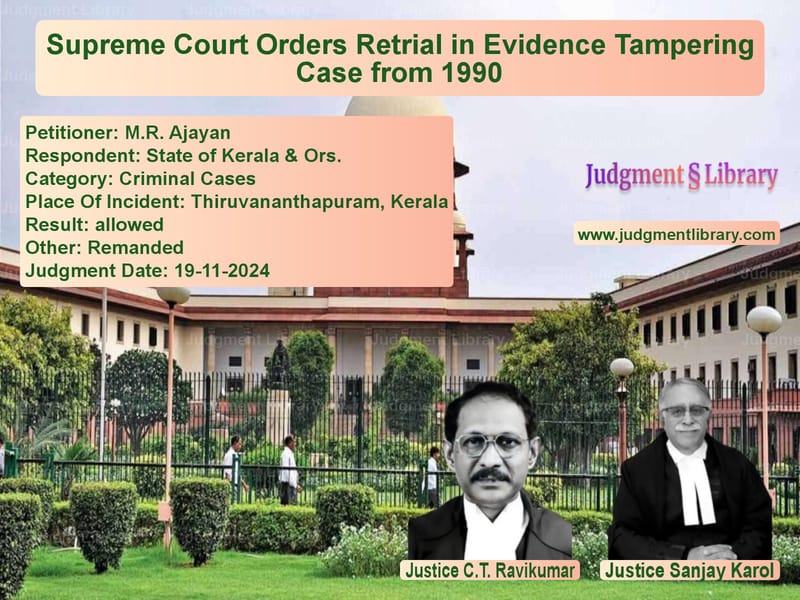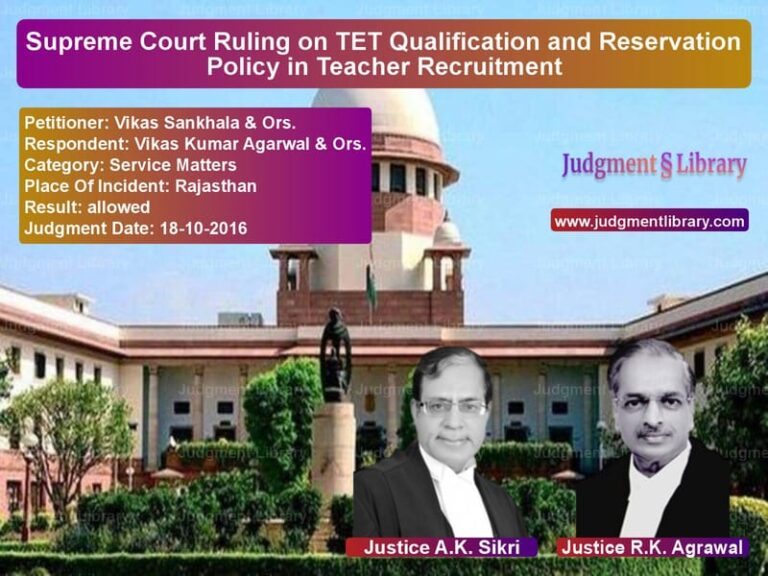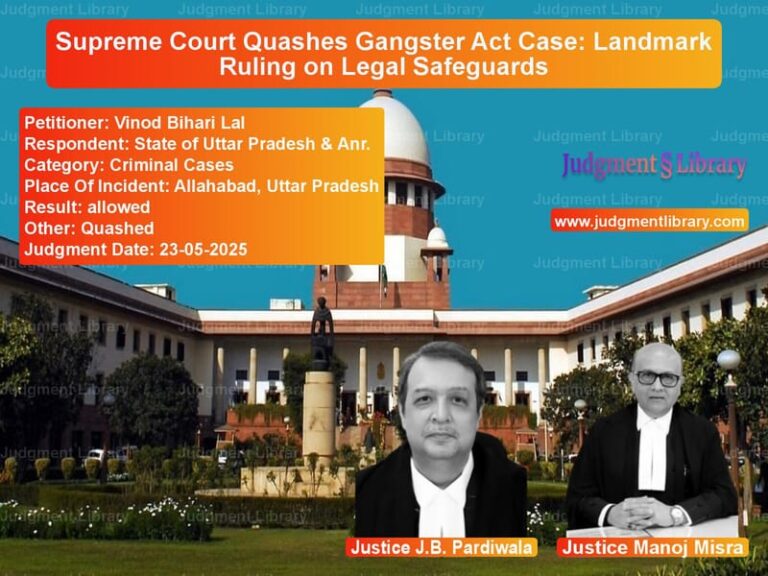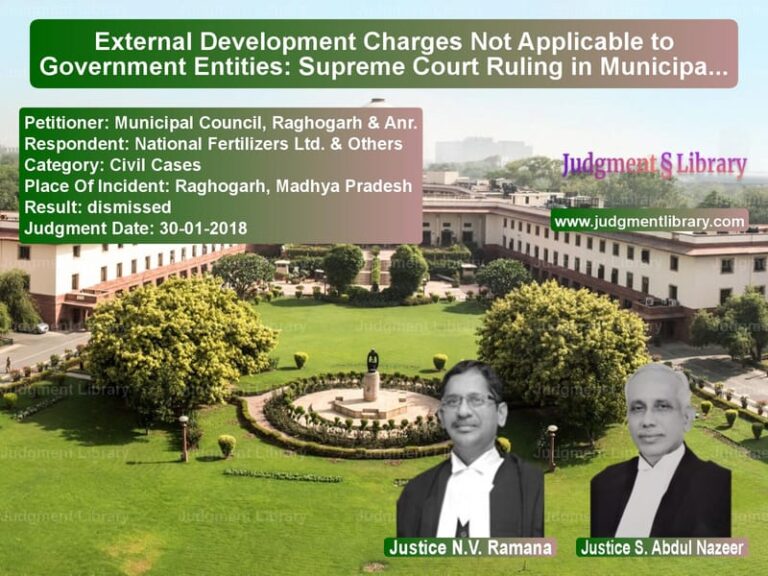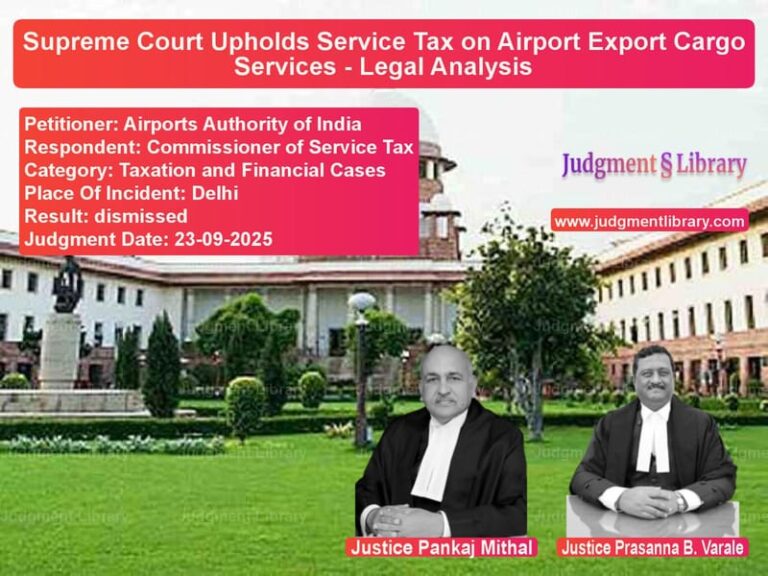Supreme Court Orders Retrial in Evidence Tampering Case from 1990
The Supreme Court of India, in a significant ruling, ordered the retrial of a decades-old case involving evidence tampering that led to the acquittal of an Australian national in an NDPS (Narcotic Drugs and Psychotropic Substances) Act case. The case, which originated in 1990, involved the alleged swapping of evidence—a critical piece of clothing—that ultimately resulted in the acquittal of the accused foreigner. The Court ruled that the Kerala High Court’s quashing of criminal proceedings against the accused was erroneous and restored the case for trial.
Background of the Case
The case dates back to April 4, 1990, when Australian national Andrew Salvatore was caught at Thiruvananthapuram airport with 55 grams and 6.6 grams of charas concealed in his underwear. An FIR was registered under Section 20(b)(ii) of the NDPS Act, and the contraband along with the accused’s personal belongings was handed over to the Valiyathura Police Station.
The police later produced the items before the Judicial First-Class Magistrate-II, Thiruvananthapuram, and entrusted them to a court clerk (Accused No.1). On July 17, 1990, an application was filed for the release of Salvatore’s personal belongings, which was granted. Among the items released was his underwear—marked as Exhibit Mo2 in court.
During Salvatore’s appeal before the Kerala High Court in 1991, it was found that the underwear presented as evidence did not match the size of the accused. The High Court observed the possibility of evidence tampering and directed the authorities to investigate the matter.
Legal Proceedings and Quashing of Charges
Following the High Court’s 1991 judgment, a vigilance inquiry was initiated, leading to the registration of FIR No. 215/94 in October 1994. The FIR named the court clerk (Accused No.1) and junior lawyer Antony Raju (Accused No.2) for allegedly altering the underwear before returning it to court to ensure it would not fit Salvatore.
After prolonged investigations, a charge sheet was filed in 2006, charging the accused under:
- Section 120B (Criminal Conspiracy)
- Section 420 (Cheating)
- Section 201 (Causing Disappearance of Evidence)
- Section 193 (False Evidence)
- Section 217 (Public Servant Disobeying Law)
- Section 34 (Common Intention) of the IPC
In 2022, the accused moved the Kerala High Court seeking quashing of the criminal proceedings, arguing that the case was barred under Section 195(1)(b) of the CrPC, which restricts private complaints in offenses related to evidence tampering. The High Court agreed and quashed the charges, directing that the case be reopened only if a complaint was filed by the competent court.
Supreme Court’s Observations
On the Locus Standi of the Appellant
The appeal was filed by M.R. Ajayan, a journalist and editor of “Green Kerala News,” as a public interest litigant. The accused, including Raju, challenged Ajayan’s locus standi, arguing that third parties could not challenge quashing orders in criminal proceedings. However, the Supreme Court ruled that since the case involved serious allegations of evidence tampering, a private individual with bona fide intent had the right to challenge the High Court’s order.
On the Application of Section 195(1)(b) of CrPC
The Supreme Court clarified that:
- Section 195(1)(b) applies when an offense is committed “in relation to” a court proceeding.
- Since the alleged alteration of Exhibit Mo2 (underwear) directly impacted judicial proceedings, prosecution under this section was valid.
- The Kerala High Court erred in concluding that the FIR should have been filed based on a judicial complaint rather than a police investigation.
On the Gravity of the Allegations
The Supreme Court criticized the alleged tampering of evidence as a direct attack on judicial integrity. It observed:
“Tampering with material evidence not only compromises the outcome of individual cases but also erodes public trust in the judiciary. The allegations in this case necessitate a full trial to uncover the truth.”
Read also: https://judgmentlibrary.com/supreme-court-acquits-man-in-1989-murder-case-due-to-lack-of-evidence/
Final Judgment
The Supreme Court set aside the Kerala High Court’s order and restored the criminal proceedings. The key directives were:
- The charges against the accused, including Raju, will be reinstated.
- The Judicial First-Class Magistrate, Nedumangad, will resume trial proceedings.
- The trial must be completed within one year.
- The accused must appear before the trial court on December 20, 2024.
Implications of the Judgment
This ruling has significant legal implications:
- It reinforces the sanctity of court evidence and upholds strict action against those who interfere with judicial proceedings.
- It clarifies that Section 195(1)(b) does not provide blanket immunity from criminal prosecution in cases of evidence tampering.
- It allows third-party litigants to challenge quashing orders in cases of public importance.
- It ensures that long-pending cases of judicial corruption and procedural fraud are pursued to their logical conclusion.
The Supreme Court’s order in this case serves as a reminder that procedural technicalities cannot be used to shield serious crimes, especially those that undermine the credibility of the justice system.
Petitioner Name: M.R. Ajayan.Respondent Name: State of Kerala & Ors..Judgment By: Justice C.T. Ravikumar, Justice Sanjay Karol.Place Of Incident: Thiruvananthapuram, Kerala.Judgment Date: 19-11-2024.
Don’t miss out on the full details! Download the complete judgment in PDF format below and gain valuable insights instantly!
Download Judgment: m.r.-ajayan-vs-state-of-kerala-&-or-supreme-court-of-india-judgment-dated-19-11-2024.pdf
Directly Download Judgment: Directly download this Judgment
See all petitions in Fraud and Forgery
See all petitions in Custodial Deaths and Police Misconduct
See all petitions in Criminal Defamation
See all petitions in Bail and Anticipatory Bail
See all petitions in Extortion and Blackmail
See all petitions in Judgment by C.T. Ravikumar
See all petitions in Judgment by Sanjay Karol
See all petitions in allowed
See all petitions in Remanded
See all petitions in supreme court of India judgments November 2024
See all petitions in 2024 judgments
See all posts in Criminal Cases Category
See all allowed petitions in Criminal Cases Category
See all Dismissed petitions in Criminal Cases Category
See all partially allowed petitions in Criminal Cases Category

